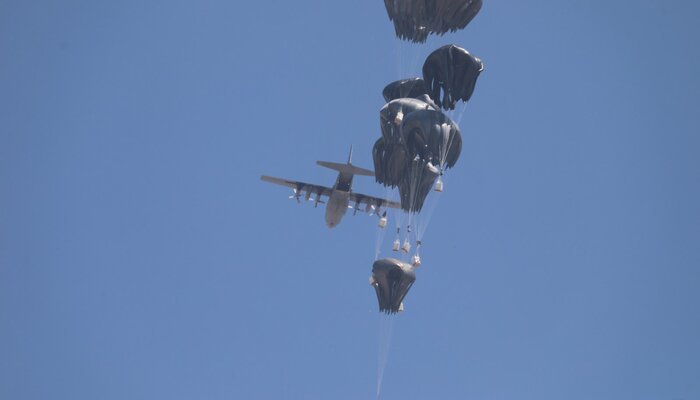Airdrops Continue, UNRWA Considers it ‘Expensive, Ineffective’

Airdrops of humanitarian aid over Gaza are continuing, despite strong criticism from the United Nations Relief and Works Agency for Palestine Refugees in the Near East (UNRWA). In a post shared on the platform X (formerly Twitter), UNRWA called the practice “very expensive and ineffective,” pointing to the limited impact of the aid deliveries and the risks associated with them.
The agency emphasized that multiple international organizations have previously raised concerns about the cost and logistical efficiency of airdrops, yet several countries persist with the method. The move reflects the desperation of the humanitarian situation in Gaza, where access to aid by land remains severely restricted.
Airdrops Persist Amid Criticism
Despite the mounting criticism, airdrops continue almost daily over different parts of Gaza, carried out by countries including the United States, France, and Jordan. The aid—typically consisting of food parcels, bottled water, and medical kits—is dropped from military aircraft and parachuted into designated zones. However, aid groups argue that this approach is not only wasteful but also potentially dangerous for civilians on the ground.
According to UNRWA, “airdrops are not a sustainable solution.” The agency insists that land-based delivery methods are far more efficient, cost-effective, and capable of meeting the scale of humanitarian needs in the densely populated enclave.
No Humanitarian Access for Over Five Months
In a stark revelation, UNRWA said it has not been allowed to deliver any form of humanitarian aid—including essential medical supplies and medicines—into Gaza for more than five months. The prolonged blockade has severely limited access for aid organizations, exacerbating an already dire crisis for the more than 2 million Palestinians living in the territory.
The lack of medical supplies has caused hospital closures and worsened the impact of disease outbreaks. UNRWA warned that without urgent intervention, the public health system in Gaza could face total collapse.
International Law and Humanitarian Access
Under international humanitarian law, access for humanitarian organizations to deliver aid to civilian populations must not be arbitrarily denied. The continuing blockade and the refusal to allow land convoys into Gaza have drawn condemnation from the UN and several rights groups.
Jan Egeland, Secretary General of the Norwegian Refugee Council, stated: “Airdrops are a symptom of the failure of diplomacy. When trucks loaded with aid are parked just across the border, dropping food from planes should be the absolute last resort—not the first.”
Operational Challenges and Risks of Airdrops
Airdrops present significant operational challenges. Strong winds, miscalculations, and poor visibility have led to incidents where aid parcels land in the sea or in unsafe areas. In several reported cases, civilians attempting to retrieve aid have been injured or killed due to falling pallets or crowd crushes.
Furthermore, aid dropped without secure distribution systems is vulnerable to looting and does not guarantee it reaches the most vulnerable populations.
UNRWA says that while it understands the symbolic gesture behind airdrops, “these efforts are often more about optics than impact.”
Read more: Israeli Attacks Kill At Least 14 Palestinians, Including Nine Aid Seekers, in Ongoing Gaza Assault
Mounting Pressure for Policy Shift
Humanitarian organizations and advocacy groups are calling on donor countries to shift their focus from aerial drops to sustained land access for aid convoys. Diplomats and UN officials are urging Israel and Egypt—who control Gaza’s border crossings—to allow regular and unhindered entry of aid trucks.
The United Nations Office for the Coordination of Humanitarian Affairs (OCHA) has echoed UNRWA’s concerns, stating in a recent report that less than 20% of the required daily humanitarian supplies are currently reaching Gaza.
Aid Workers Under Threat
Adding to the difficulty is the targeting of humanitarian workers. According to UNRWA, dozens of its staff members have been killed in the ongoing conflict, and others have faced harassment, detention, or obstruction while attempting to carry out their duties.
UNRWA Commissioner-General Philippe Lazzarini stressed, “We are committed to staying and delivering, but we cannot do this if our convoys are blocked and our staff are unsafe.”
A Call for Immediate Humanitarian Corridors
UNRWA and other agencies continue to push for the establishment of humanitarian corridors that would allow consistent, safe passage for supplies and aid personnel. They argue that airdrops should be phased out in favor of more effective methods that reach people in need with speed, scale, and safety.
As the humanitarian crisis in Gaza deepens, the pressure on the international community to find sustainable solutions beyond airdrops is increasing. For now, the skies remain filled with aid packages—offering a lifeline, but not a solution.
Follow us on Instagram, YouTube, Facebook,, X and TikTok for latest updates




